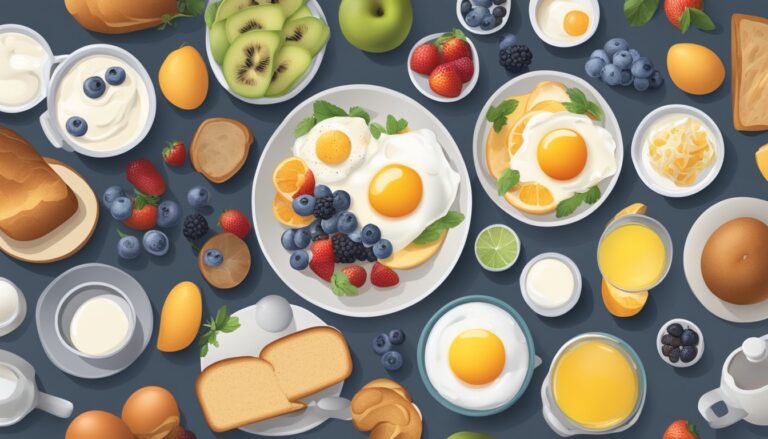Breakfast sets the tone for the day, making it crucial to choose meals that are both nutritious and satisfying. Low-fat breakfast options can provide essential nutrients without excessive calories, supporting overall health and weight management goals. These 15 naturally low-fat breakfast recipes offer delicious ways to start your morning while keeping fat content in check.
From protein-packed egg dishes to fiber-rich oatmeal variations, these recipes cater to diverse tastes and dietary needs. Greek yogurt parfaits, chia seed puddings, and whole grain toast with nutrient-dense toppings feature prominently in this collection. Each recipe focuses on incorporating lean proteins, complex carbohydrates, and fresh fruits or vegetables to create balanced meals that fuel the body and mind for the day ahead.
The Importance of Breakfast for Heart Health

Starting the day with a heart-healthy breakfast sets the tone for balanced nutrition and cardiovascular well-being. A nutrient-dense morning meal supports heart function and helps manage cholesterol levels.
Understanding Nutrient Density and Heart Health
Nutrient-dense breakfast choices provide essential vitamins, minerals, and antioxidants that support cardiovascular health. Whole grains offer fiber, which helps lower LDL cholesterol. Berries and citrus fruits contain flavonoids that may reduce heart disease risk.
Lean proteins like egg whites or low-fat Greek yogurt provide satiety without excess saturated fat. Plant-based options such as oatmeal with nuts or avocado toast on whole grain bread deliver heart-healthy fats and fiber.
Incorporating omega-3 rich foods like chia seeds or ground flaxseed boosts anti-inflammatory benefits. Green smoothies made with spinach or kale offer folate and potassium to support blood pressure regulation.
Balancing Macronutrients for a Low-Fat Start
A balanced breakfast includes carbohydrates, proteins, and healthy fats in appropriate proportions. Complex carbohydrates from whole grains provide sustained energy and fiber. Lean proteins support muscle health without adding excessive saturated fat.
Unsaturated fats from sources like nuts, seeds, and olive oil contribute to heart health. These fats help improve cholesterol ratios by increasing HDL (good) cholesterol. Monounsaturated fats found in avocados can help lower LDL cholesterol levels.
Limiting saturated fats is crucial. Choose low-fat dairy or plant-based alternatives. Replace bacon or sausage with turkey bacon or vegetarian options. Egg whites offer protein without the cholesterol found in yolks.
Essentials of Low-Fat Breakfast Ingredients

Creating nutritious low-fat breakfasts relies on selecting the right ingredients. These components provide essential nutrients while keeping calorie and fat content in check.
Whole Grains and Fiber-Rich Foundations
Whole grains form the backbone of many healthy breakfast options. Oats, particularly rolled oats, are a versatile and fiber-rich choice. They can be prepared as oatmeal, used in homemade granola, or incorporated into pancake batter.
Whole grain breads and cereals offer complex carbohydrates and sustained energy. Look for products with at least 3 grams of fiber per serving.
Quinoa and barley make excellent alternatives to traditional breakfast grains. They provide protein and can be used in both sweet and savory morning meals.
Proteins that Protect: Lean Options
Lean proteins are crucial for building and repairing tissues. Egg whites are a popular low-fat protein source, easily scrambled or used in omelets.
Greek yogurt offers a creamy texture and high protein content without excess fat. It can be eaten plain, mixed with fruit, or used as a topping.
Lean meats like turkey breast or Canadian bacon provide protein with less saturated fat than their full-fat counterparts.
Plant-based options include tofu, tempeh, and legumes. These can be seasoned and prepared in various ways to suit different taste preferences.
Fruits and Vegetables: Essential Vitamins and Minerals
Fresh produce adds color, flavor, and vital nutrients to breakfast dishes. Berries are rich in antioxidants and pair well with yogurt or oatmeal.
Leafy greens like spinach and kale can be blended into smoothies or added to egg dishes for an extra nutrient boost.
Citrus fruits provide vitamin C and can brighten up morning meals. Try adding orange segments to a fruit salad or squeezing lemon juice over avocado toast.
Vegetables like tomatoes, bell peppers, and mushrooms are excellent additions to savory breakfasts. They add volume and nutrients without significant calories.
Healthy Fats: Selecting Beneficial Oils and Seeds
While keeping fat content low, it’s important to include some healthy fats. Avocado provides monounsaturated fats and can be spread on toast or added to smoothies.
Nuts and seeds offer omega-3 fatty acids and protein. Use them sparingly as toppings for oatmeal or yogurt.
Olive oil and flaxseed oil can be used in small amounts for cooking or as dressings. They provide essential fatty acids without excess saturated fat.
Chia seeds are rich in omega-3s and fiber. They can be sprinkled on cereal or used to make puddings.
Showcase of Low-Fat Breakfast Recipes
Discover a variety of delicious and nutritious low-fat breakfast options that will kickstart your day. These recipes combine wholesome ingredients to create satisfying meals without excess calories.
Traditional Oatmeal Reinvented
Oatmeal serves as an excellent base for a low-fat breakfast. Try a Mediterranean-inspired version by topping cooked oats with a sprinkle of sliced almonds, chopped fresh fruit, and a dollop of Greek yogurt. For added nutrition, incorporate chia seeds into your oatmeal.
Overnight oats offer a convenient twist. Mix rolled oats with milk and yogurt, then refrigerate overnight. In the morning, add berries, a drizzle of honey, and a handful of nuts for crunch.
For a savory option, prepare steel-cut oats with vegetable broth instead of water. Top with sautéed mushrooms, spinach, and a poached egg for a hearty meal.
Innovative Egg Dishes
Egg white scrambles provide a protein-rich, low-fat breakfast. Combine egg whites with spinach, tomatoes, and herbs for a flavorful and nutritious meal. Add a sprinkle of feta cheese for extra taste without significantly increasing the fat content.
Vegetable frittatas offer another versatile option. Beat whole eggs with egg whites, then mix in diced bell peppers, onions, and zucchini. Bake in a non-stick skillet for an easy, low-fat breakfast that can be portioned and reheated throughout the week.
Try egg muffins for a grab-and-go breakfast. Whisk eggs with vegetables and pour into muffin tins. Bake until set for individual portions of a protein-packed, low-fat meal.
Refreshing Smoothies and Smoothie Bowls
Smoothies provide a quick and easy low-fat breakfast option. Blend Greek yogurt, spinach, banana, and mixed berries for a nutrient-dense drink. Add a scoop of protein powder for an extra boost.
Green smoothies offer a refreshing start to the day. Combine kale or spinach with pineapple, banana, and coconut water for a tropical twist. A handful of mint leaves adds brightness to the flavor profile.
Smoothie bowls elevate the traditional smoothie. Create a thicker base by using less liquid and frozen fruit. Pour into a bowl and top with sliced fruit, a sprinkle of granola, and a drizzle of honey for a satisfying, low-fat breakfast.
High-Protein Yogurt Parfaits
Greek yogurt parfaits provide a protein-rich, low-fat breakfast option. Layer non-fat Greek yogurt with fresh berries and a sprinkle of low-fat granola. Add a drizzle of honey for sweetness.
For a tropical variation, combine Greek yogurt with diced mango and pineapple. Top with toasted coconut flakes and a sprinkle of chia seeds for added texture and nutrition.
Create a dessert-inspired parfait by mixing Greek yogurt with a small amount of cocoa powder. Layer with sliced bananas and a few dark chocolate chips for a decadent yet low-fat breakfast treat.
Avocado Toast Variations
Avocado toast offers a satisfying low-fat breakfast when prepared thoughtfully. Start with whole grain toast for fiber, then spread with mashed avocado. Top with sliced tomatoes and a sprinkle of salt and pepper.
For added protein, crown your avocado toast with a poached egg. The runny yolk creates a rich sauce without adding significant fat.
Try a Mediterranean version by topping avocado toast with cucumber slices, crumbled feta, and a drizzle of olive oil. This combination provides healthy fats and fresh flavors.
Savory Breakfast Salads
Breakfast salads offer a light, refreshing start to the day. Combine mixed greens with sliced hard-boiled eggs, cherry tomatoes, and cucumber. Dress lightly with lemon juice and a touch of olive oil.
For a protein-packed option, top spinach leaves with grilled chicken breast, sliced strawberries, and a sprinkle of almonds. A balsamic vinaigrette complements the flavors without adding excess fat.
Create a Mexican-inspired breakfast salad by combining chopped romaine lettuce with black beans, corn, and diced avocado. Top with a dollop of salsa for a zesty, low-fat morning meal.
Creative Twists on Low-Fat Breakfast Classics

Reinventing traditional breakfast favorites with healthier ingredients offers delicious ways to start the day. These innovative twists maintain flavor while reducing fat content.
Upgraded Cereal Bowls
Transform plain breakfast cereals into nutrient-packed meals. Mix whole grain cereals with Greek yogurt for added protein. Top with fresh berries, sliced almonds, and a sprinkle of chia seeds.
For a warm option, prepare steel-cut oats with unsweetened almond milk. Stir in cinnamon, diced apples, and chopped walnuts. This combination provides fiber, healthy fats, and natural sweetness.
Create a tropical twist by adding mango chunks and unsweetened coconut flakes to bran flakes. This refreshing mix offers vitamins and minerals without excessive sugar.
Healthy Versions of Pancakes and Waffles
Swap traditional pancake batter for protein-rich alternatives. Blend banana, egg whites, and oats for a simple, low-fat base. Cook on a non-stick griddle to avoid extra oil.
Try buckwheat or whole wheat flour for nutty-flavored waffles. Add puréed pumpkin or sweet potato to boost nutrition and moisture without fat. Serve with a dollop of Greek yogurt and fresh fruit instead of syrup.
For a savory option, make zucchini pancakes. Grate zucchini, mix with egg whites, whole wheat flour, and herbs. These veggie-packed pancakes pair well with a side of smoked salmon.
Novel Takes on Eggs and Toast
Reimagine egg dishes for lighter fare. Create a vegetable-packed frittata using mostly egg whites with one or two whole eggs for richness. Fill with spinach, tomatoes, and feta cheese.
For a twist on avocado toast, try mashed cannellini beans on whole grain bread. Top with sliced hard-boiled egg and a sprinkle of paprika. This provides protein and fiber with less fat than avocado.
Make a low-fat egg tartine by spreading hummus on toasted sourdough. Top with a poached egg and fresh herbs. For extra flavor, add a small amount of smoked salmon or turkey breast.
Strategies for Ensuring a Low-Fat Breakfast

Crafting a low-fat breakfast requires thoughtful planning and smart food choices. By focusing on portion control, meal prep, and avoiding certain ingredients, you can create nutritious and satisfying morning meals.
Portion Control and Meal Composition
Controlling portion sizes is crucial for maintaining a low-fat breakfast. Use smaller plates to naturally limit serving sizes. Aim for a balance of macronutrients, with a focus on lean proteins and complex carbohydrates.
Include a serving of fruit or vegetables with each breakfast. This adds volume and nutrients without excess calories. Choose whole grains like oatmeal or whole wheat toast for fiber and sustained energy.
Incorporate lean proteins such as egg whites, low-fat Greek yogurt, or cottage cheese. These help build and maintain muscle while promoting fullness.
The Role of Meal Prep in Diet Adherence
Meal prep can significantly boost adherence to a low-fat breakfast plan. Set aside time each week to prepare ingredients or full meals in advance. This reduces the temptation to reach for convenient, high-fat options when pressed for time.
Pre-portion smoothie ingredients into freezer bags for quick blending. Cook a batch of hard-boiled eggs or overnight oats for grab-and-go options. Wash and cut fruits and vegetables to make them readily available for morning consumption.
Consider preparing a week’s worth of breakfast burritos with whole wheat tortillas, egg whites, and vegetables. Freeze them individually for easy reheating.
Breakfast Foods to Limit or Avoid
To maintain a low-fat breakfast regimen, certain foods should be limited or avoided. Skip high-fat meats like bacon and sausage. Opt for lean alternatives such as turkey bacon or Canadian bacon if desired.
Minimize the use of butter and cream cheese. Instead, try nut butters in moderation or avocado for healthy fats. Limit pastries, muffins, and other baked goods high in saturated fats and added sugars.
Be cautious with granola and cereals, which can be deceptively high in fats and sugars. Read labels carefully and choose options with minimal added sugars and unhealthy fats.
Conclusion

Low-fat breakfast recipes offer a delicious way to start the day on a healthy note. These options provide essential nutrients without excess calories or unhealthy fats.
Incorporating whole grains, lean proteins, and fresh fruits into morning meals can boost energy levels and support weight management goals. Oatmeal, egg whites, and Greek yogurt are versatile ingredients that form the foundation of many nutritious breakfasts.
Experimenting with different flavor combinations keeps meals interesting. Adding spices, herbs, and natural sweeteners can enhance taste without compromising nutritional value.
Preparing breakfast at home allows for better control over ingredients and portion sizes. This practice can lead to improved eating habits throughout the day.
By choosing naturally low-fat breakfast options, individuals can enjoy satisfying meals that align with their health objectives. These recipes demonstrate that nutritious eating can be both simple and enjoyable.




